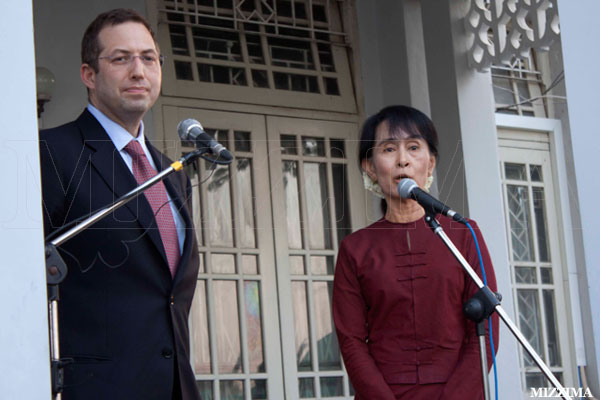Restricting the Burmese media’s freedom of speech holds back the development of the nation, National League for Democracy chairman Aung San Suu Kyi said on Wednesday.
 Speaking at a press conference after her 90-minute meeting with U.S. Special Envoy to Burma Ambassador Derek Mitchell, she referred to two recent libel suits filed by the government against the news media.
Speaking at a press conference after her 90-minute meeting with U.S. Special Envoy to Burma Ambassador Derek Mitchell, she referred to two recent libel suits filed by the government against the news media.
Observers say the libel suits are not in keeping with recent statements by President Thein Sein and Lower House Speaker Shwe Mann, who have called for the press to play a constructive role in society.
In one story, the Modern Journal published a news article about poorly constructed and damaged roads and bridges in Thabeikkyin Township and was sued by a township engineer; later, the Ministry of Mines said it would sue The Mirror after the news journal published information from a government report alleging financial misconduct by various ministries
“Just take photos of the damaged roads and publish. If they sue, just face the trial. The journals said the roads were damaged because they really were damaged. Preventing [media] from telling the truth is restricting the freedom of media and it is like restricting the development of the country,” Suu Kyi said. The majority of publications in Burma now exercise a “self-censorship” approach to covering evetns and personalities. However, publications that cover news, business and religion still must pass all content through government censors prior to publication, which has a "chilling" affect on the press.
Mitchell, on his sixth visit to Burma, arrived on March 11. He discussed the upcoming April 1 by-election with Suu Kyi, who has recently expressed concerns about the fairness of the campaign process.
“We are having some problems…so we would very much like the world to watch what is going on, to ensure that the elections are everything they should be,” she told reporters after their meeting at her home in Rangoon.
The NLD has had trouble getting government permission to use campaign venues and has publicly complained about voting lists with names of dead people, and people who no longer live in the constituency.
Mitchell said he raised such concerns with government officials in Naypyitaw and had “productive, candid discussions” about the election process.
“We were clear in private and will be in public that the issue of a free, fair, and transparent election is very important to us, in terms of demonstrating, in tangible terms, the commitment to democracy that they have assured us they are on the road towards,” he said.
In spite of claims that it would consider outside poll observers, the government is not allowing outside international observers to observe the election.
“They had heard from many different sources, including Asean and the United States and others, that it would be a good faith and reassuring gesture of commitment. But there were no assurances [from the [election] commission,” Mitchell said.
The NLD is contesting 47 of the 48 seats that have been vacated by lawmakers appointed to government posts.
The opposition forces in Burma, no matter the election’s outcome, will remain a very small force in Parliament, but Suu Kyi said that’s acceptable: “Even if we win only 47 seats, we can still do a lot,” she said. “It’s about what we really can do from within the legislature.”
In a recent campaign speech broadcast over state-run television, she said the NLD party would work for the rule of law, ending ethnic conflict and amending the 2008 Constitution.


